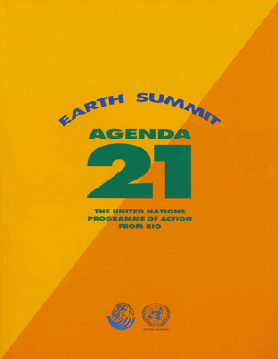Agenda 21
Agenda 21 is a non-binding action plan of the United Nations with regard to sustainable development. It was adopted by 178 governments at the United Nations Conference on Environment and Development (UNCED) held in Rio de Janeiro, Brazil, in June 1992. Its goal is to address the pressing problems of today and also aim for a future where economic development is conducted without depleting the natural resources of the earth, ensuring that future generations will receive their rightful inheritance of a healthy planet.
Overview[edit | edit source]
Agenda 21 outlines a comprehensive plan of action to be taken globally, nationally, and locally by organizations of the United Nations System, Governments, and Major Groups in every area in which humans impact the environment. The "21" in Agenda 21 refers to the 21st Century. It has been affirmed and modified at subsequent UN conferences.
Since its launch, Agenda 21 has been implemented by some UN Member States with the support of national and international non-governmental organizations (NGOs). The implementation process has varied in success; some countries have integrated Agenda 21 into their national policies, while others have faced challenges in its implementation.
Development and Implementation[edit | edit source]
The development of Agenda 21 was influenced by the concept of sustainable development, which aims to meet the needs of the present without compromising the ability of future generations to meet their own needs. The Agenda covers a wide range of topics, including poverty, hunger, health, education, climate change, gender equality, water, sanitation, energy, urbanization, and the protection of ecosystems. It emphasizes that in sustainable development, environmental protection shall constitute an integral part of the development process and cannot be considered in isolation from it.
Agenda 21 encourages countries to develop and implement strategies that integrate economic, social, and environmental objectives. It also promotes the participation of all stakeholders, including governments, businesses, NGOs, and the public, in the decision-making process.
Criticism and Controversy[edit | edit source]
Despite its objectives, Agenda 21 has been subject to criticism and controversy, especially among some groups in the United States who view it as an attempt by an international organization to impose its will on sovereign nations and individuals. Critics argue that Agenda 21 infringes on national sovereignty, private property rights, and the freedom of individuals. These criticisms are often fueled by conspiracy theories that misinterpret the goals of the agenda.
Legacy and Future[edit | edit source]
Agenda 21 has played a significant role in shaping international environmental policy and has influenced the development of more recent initiatives, such as the Sustainable Development Goals (SDGs) adopted by the United Nations in 2015 as part of the 2030 Agenda for Sustainable Development. The SDGs aim to continue the work started by Agenda 21 and address additional sustainability challenges facing the world.
See Also[edit | edit source]
- Sustainable Development
- United Nations Conference on Environment and Development
- Sustainable Development Goals
- Environmental policy
| This article is a stub. You can help WikiMD by registering to expand it. |
Search WikiMD
Ad.Tired of being Overweight? Try W8MD's physician weight loss program.
Semaglutide (Ozempic / Wegovy and Tirzepatide (Mounjaro / Zepbound) available.
Advertise on WikiMD
|
WikiMD's Wellness Encyclopedia |
| Let Food Be Thy Medicine Medicine Thy Food - Hippocrates |
Translate this page: - East Asian
中文,
日本,
한국어,
South Asian
हिन्दी,
தமிழ்,
తెలుగు,
Urdu,
ಕನ್ನಡ,
Southeast Asian
Indonesian,
Vietnamese,
Thai,
မြန်မာဘာသာ,
বাংলা
European
español,
Deutsch,
français,
Greek,
português do Brasil,
polski,
română,
русский,
Nederlands,
norsk,
svenska,
suomi,
Italian
Middle Eastern & African
عربى,
Turkish,
Persian,
Hebrew,
Afrikaans,
isiZulu,
Kiswahili,
Other
Bulgarian,
Hungarian,
Czech,
Swedish,
മലയാളം,
मराठी,
ਪੰਜਾਬੀ,
ગુજરાતી,
Portuguese,
Ukrainian
Medical Disclaimer: WikiMD is not a substitute for professional medical advice. The information on WikiMD is provided as an information resource only, may be incorrect, outdated or misleading, and is not to be used or relied on for any diagnostic or treatment purposes. Please consult your health care provider before making any healthcare decisions or for guidance about a specific medical condition. WikiMD expressly disclaims responsibility, and shall have no liability, for any damages, loss, injury, or liability whatsoever suffered as a result of your reliance on the information contained in this site. By visiting this site you agree to the foregoing terms and conditions, which may from time to time be changed or supplemented by WikiMD. If you do not agree to the foregoing terms and conditions, you should not enter or use this site. See full disclaimer.
Credits:Most images are courtesy of Wikimedia commons, and templates, categories Wikipedia, licensed under CC BY SA or similar.
Contributors: Prab R. Tumpati, MD

